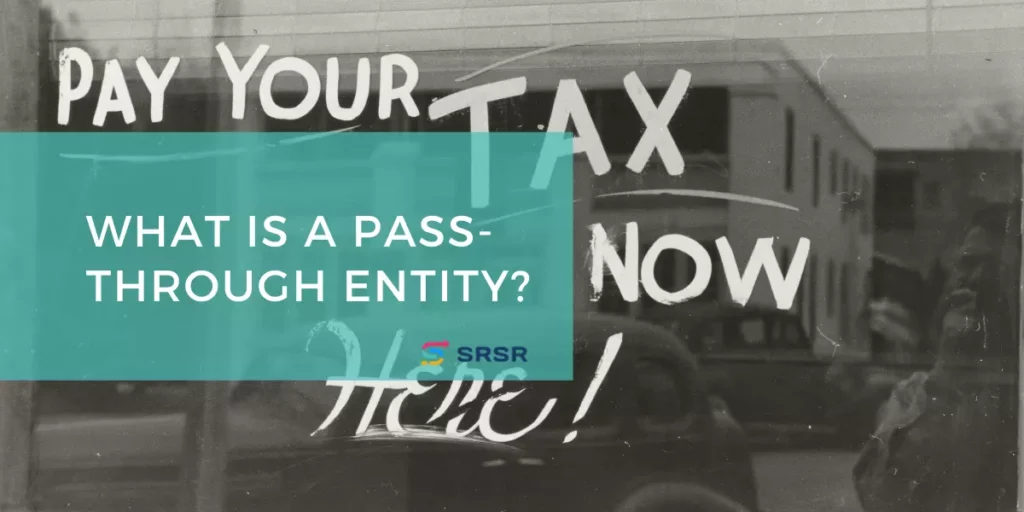If you aren’t sure how taxes work, this article will help you whether you want to start a business or have already started one.
Pass-through entities are some of the most common businesses in the United States, but they can be a little confusing at first, especially for a new business owner.
We’ll go over what a pass-through entity is, how they work, the different kinds of pass-through entities that exist, and the advantages and disadvantages of having this type of business. This type of incorporation isn’t for everyone, but it can be a powerful way to start your business.
What Is A Pass-Through or Flow-Through Entity?
Pass-through entities are also sometimes called flow-through entities; the two terms mean the same thing and can be used interchangeably. A pass-through entity is any business that doesn’t pay direct taxes as a business. These entities produce income, but that income isn’t taxed until it’s distributed to the owner or owners.
Once the income is sent to the owner or owners (or anyone else involved in a business’s profit share), they pay taxes on the full amount as part of their regular income taxes. They don’t need to file taxes separately for income from the pass-through entity, though there will be some additional documentation in addition to any other tax documents, like a W2, that they might get from other sources.
The main advantage is it avoids double taxation, where a business’s profits are taxed first as a business, and then on the income taxes of the owners or shareholders. It also avoids your business having to pay someone to file taxes, or the time and effort of an employee to put together a business tax return.
However, because there are some limitations on what a flow-through entity can do, like how many shareholders it can have or how it can raise capital for business operations, some businesses may benefit more by becoming a C-Corporation instead of a pass-through entity.
We’ll discuss this more in the pros and cons section.
How do Pass-Through-Entities work?
There are a couple of things you need to know about pass-through entities.
The main thing that makes a pass-through entity a pass-through entity is that the tax burden on profits passes through the business and goes directly to the owners and other profit-share members. In general, pass-through entities distribute all of their profits to owners or shareholders in the business. They can have a business account with money for expenses, but, unlike a C-Corp or a trust, they generally don’t save money for anything other than operating expenses and a small amount to help protect the business in the long term.
More importantly, these businesses generally don’t invest directly in other businesses or index funds, though the owners and shareholders are welcome to do so.
Most people associate pass-through entities with small businesses, and that used to be true. Today, though, businesses of all sizes can be pass-through businesses. Rather than being size-limited, businesses are choosing the type of incorporation that makes the most sense with their business’s needs. A small percentage of pass-through entities are large businesses that either wouldn’t benefit from other types of incorporation or that operate in ways where being a pass-through entity offers more advantages than other types of incorporation.
The decision about what type of business your business should be is up to you and the other owners or shareholders in your business. That said, if you aren’t sure what model is most appropriate for you, you can always consult with a financial or business advisor to see what options they recommend for your business.
Types Of Pass-Through-Entities
There are several kinds of pass-through entities that all work a little differently. Choosing the right one is an important part of setting your business up for success, but you can change what kind of business you have later if you realize that you chose the wrong style of business initially, or your business’s need changes over time.

S-Corporations
S-Corporations are one of the forms of a pass-through entity that you might not have heard of before you started your business. Don’t worry! They aren’t too complicated.
Businesses need to declare themselves an S-Corp within a certain window each year to qualify for this status. Businesses that have declared themselves S-Corps report their corporate tax with form 1120S, but they aren’t taxed with that form. The reported profits are passed to the owners and shareholders according to the profit share agreement.
Owners and shareholders must agree to make their business an S-Corp, including signing the required documentation.
The advantage of an S-Corp over a limited liability company (LLC) is that owners aren’t required to pay Self-Employed Contributions Act (SECA) taxes (we’ll cover these in the LLCs and Partnerships section), but they do need to pay “reasonable compensation” which is taxed under the Federal Insurance Contributions Act (FICA).
Sole Proprietorships
Sole proprietorships are the single most common type of business in the United States, and they are also the most common type of pass-through entity. This is the default type of business for most contractors, freelancers, and people trying to start a small business on the side.
The main advantage of this kind of business is that they are very easy to set up. However, they also come with fewer legal and financial protections since there is less separation between the owner’s business and their personal finances.
Sole proprietorships pay taxes on Schedule C of Form 1040 and are generally considered a good starting place for low-risk businesses. If you have a business that is more likely to involve risk, like being an individual stylist or massage therapist with the risk of being sued by your clients, you may benefit from a form of incorporation that separates your personal and business finances.
LLCs and Partnerships
Partnerships are an alternative to Sole Proprietorships for businesses with at least two owners. These businesses split the costs and profits of business between the partners, though the split isn’t necessarily required to be even.
Partnerships do file their taxes at an entity level, with Form 1065, and owners are subject to the Self-Employed Contributions Act tax. This is just a tax that people who work for themselves pay since they are responsible for individual taxes as well as the portion of taxes normally paid by an employer.
An LLC stands for Limited Liability Corporation and is another option suitable for businesses with multiple owners or in some cases individual business owners. As such, there are technically two types of LLCs a single-member LLC which is similar to a sole proprietorship, and multi-member LLCs which are similar to partnerships.
Members of a multi-member LLC pay income taxes using Schedule K-1, with their share of business profits on Form 1065.
Other types Of Pass-Through-Entities
We’ve already covered all 4 types of pass-through entities in the United States, but it’s worth mentioning that other kinds of business entities can qualify for pass-through status in other parts of the world. For instance, in Canada, certain kinds of trusts may also qualify for this kind of tax exemption.
If your business is starting to expand into different locations, it might be worth looking into the differences in their business law and seeing if a different kind of business entity is appropriate in the new location.
Advantages and disadvantages Of Pass-Through Entities

There are advantages and disadvantages to setting up your business as a pass-through entity. If there weren’t some disadvantages to this system, every business would be some kind of pass-through entity, and if there weren’t some significant advantages to this system, no one would bother.
Here are some of the key advantages and disadvantages you should consider when you’re deciding what kind of incorporation is right for your business.
Pass-Through Entity Advantages
The main advantage here is that you get certain tax benefits for the business. Having a pass-through entity avoids the business directly paying taxes, which means that business income is only taxed once, through the owner’s income taxes. However, there are other business advantages.
Clubbed income: For businesses where some of the partners are also married, like in a case where two couples start a business together, the income for each couple is clubbed, or combined, which means it’s only taxed once for both of them.
You can take advantage Of the basic business deduction: Up to 20% of the income from your business can be deducted as qualified business income. This helps reduce the overall tax burden on your business, especially as it starts to grow.
Limited liability: If your business is a Limited Liability corporation your finances are also protected in addition to having the option of treating your business as a pass-through entity. That means that if the business is sued or otherwise owes damages for any reason, only the business’s own assets are at risk. Owners are protected from litigation and liability for the business’s actions.
Designation can be changed: While your business is a pass-through entity it is easy to change what kind of business entity it is as your situation changes over time. That means that you have a lot of flexibility in your business and how you are taxed, and you can shift how your business operates to suit your needs over time.
Disadvantages of Pass-Through Entities
There are also a few disadvantages to think about before you get started:
Less control over profit share: Many businesses get started with a profit share between owners and contributors, and many businesses want complete control over the split of profits. However, some types of pass-through entities may require an owner or contributor’s share of the profits to be equal to their percentage of ownership, which can cause disagreements.
Different rules in different areas: One of the biggest challenges with pass-through entities is that different kinds of businesses will have different levels of regulation and protection in different states. Especially if your business has multistate ownership you need to know the regulations in the state you’re incorporating in, as well as each state’s differences.
Only the state you register in will matter, in terms of how the business runs, but you might want to change which state you register in depending on regulatory differences.
Tax complications: While having a pass-through entity is meant to help lower the overall tax burden on your business, it increases the tax burden for owners and members of your profit share. There are points, both as a business and as individuals, where it may make sense to pay corporate taxes to simplify the owners’ tax returns.
Not all Pass-Through Entities protect From liability: Only LLCs protect individuals from liability, so if you’re operating a business with significant liability risk, it’s worth exploring what options offer you the most protection.
Common questions about Pass-Through Entities:Â

Taxes are complicated and figuring out your taxes after starting a business can sometimes feel like a herculean task. Here are a few of the most common questions we get about pass-through entities, paying your taxes after starting a business, and how your income from your business is taxed.
Q1. Is Having a Pass-Through-Entity Common?
Yes. In the United States, as many as 95% of businesses were pass-through entities, and sole proprietorships were the most common business model overall.
Having a pass-through entity is incredibly common, especially for small businesses or businesses that start small, even if they are looking to expand later.
Fortunately, as your business grows and changes, you can always change your tax status to whichever category best suits your business and your financial needs.
Q2. Are Pass-Through Entities legal?
Yes, pass-through entities are entirely legal. In fact, this type of incorporation is more common than any other, and this kind of tax status was created to help make it easier for small businesses to succeed.
So, don’t worry about skipping out on taxes or not paying your fair share as the owner of a pass-through entity. Your personal income taxes will still cover the tax burden your business owes the government, and you’re paying your fair share into the system and supporting our infrastructure.
Plus, as a small business owner, you’re helping make our economic system more diverse, which in turn helps create more opportunities for other people like you.
Q3. Are there requirements to make your business a Pass-Through Entity?
Not really, though this model is most effective for smaller businesses. While larger businesses do get double taxation once they stop being pass-through-entities, it makes more sense for them to be taxed that way than it would to continue with being an S-Corporation or similar entity, especially since switching to a C-Corporation can help businesses seek additional sources of funding.
Switching to a C-Corporation can also be an advantage past a certain level of profit because it can help limit taxation. C corporations pay a flat 21% business tax on profits, or net income minus deductions. Since pass-through entities mean that the business’s owners carry the tax burden on their incomes, that can result in higher taxes for some corporations. That’s because the maximum tax rate individuals might pay on their profit share is 37%, significantly more than 21%.
So, while there are no requirements to be a pass-through entity, most of the advantages of being a pass-through entity work only while the business is small. Larger organizations benefit more from changing their tax status.
Q4. Does Income From A Pass-Through Entity Count As Casual Income?
No. From a tax perspective, one of the requirements for casual income is that the income isn’t anticipated, and is unlikely to recur.
That means, even if your business only distributes its profit share to owners once a year, meeting the requirement that casual income be unlikely to recur in the same tax year, it’s still anticipated income.
Additionally, since the business is likely to continue distributing profits so long as it exists, those profits may get both larger and more frequent. This kind of income doesn’t meet the anticipation requirement.
Most of the time this is good news for business owners. Casual income has a flat tax rate of 30%. Hence, you’re likely to pay more on casual income than you would as part of your regular income taxes. Casual income also doesn’t allow for any deductions. This means that you wouldn’t be able to make business deductions if you counted business income as casual income.
Wrapping up
When deciding whether you should make your business a pass-through entity, it’s important to consider the needs of all your profit-sharing members, as well as your liability concerns, current financial standing, and whether you anticipate outgrowing S corporation status in the next tax year.
But, if you’re confident that your business will benefit from being a pass-through entity and all of your partners and profit-sharing members agree, there are good reasons to make your business a pass-through entity and avoid double taxation.

